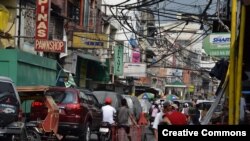The middle class will play an increasingly important role in 2014, according to the World Resources Institute (WRI), which takes the pulse of the planet each year.
Global population is expected to top 8 billion by 2030, with five billion in the middle class, which grew from one billion in 1990 to three billion in 2010.
WRI is a global research group that focuses on policies that protect the environment and its ability to sustain the world's growing population.
“Can we enjoy this growing prosperity and tackle sustainability at the same time?" asked WRI President Andrew Steer. "We believe the answer is yes, but some key decisions that will be made in 2014 will affect how we do it.”
Steer calls 2014 the year of cities. Every day, he says, 270,000 people climb the economic ladder and move into cities.
“Seventy-five million this year, 75 million next year, three-quarters of a billion this decade, three-quarters of a billion next decade,” he said.
While cities drive the world economy, they also account for 70 percent of climate changing emissions. Dirty air is blamed for 1 million premature deaths. So Steer says cities are being re-designed to make them more livable.
Brazil, where 85 percent live in cities, is on the road to change.
“Brazil now has a remarkable new law that says 3,000 cities in Brazil need to have mobility plans. What does that mean? You think about public transportation, how people are going to get on there, how they are going to get to work," Steer said. "It’s Brazil that introduced Curitiba Bus Rapid Transit. Now more than 12 million people travel on that every single day. Three hundred cities around the world growing hugely rapidly now have bus rapid transit.”
Steer also predicts that, in the face of the loss of global forest cover at the rate of the equivalent of 50 football fields a minute, two billion hectares in the world could be transformed.
That's the amount of land - two times the size of China - that has been degraded, yet is ripe for forest or farm restoration. World governments have promised to restore 150 million hectares by 2020. Steer says that it would be like closing 350 large coal fired power plants.
However China, the world’s largest polluter, has proposed adding 363 coal-fired power plants to its energy sector. Yet Steer notes that China is taking aggressive measures to reduce emissions, starting with $277 billion directed at air pollution.
“That’s now going to start being spent this year; a ban on new coal plants in three major metropolitan areas, tighter pollution standards that will make some of the planned coal plants less attractive and so they won’t be built," Steer said. "And last year 50 percent of all China’s new electricity was generated from renewable sources.”
Also in 2014, the United States is expected to release new rules that curb emissions from existing power plants, the United Nations will host a summit on climate change, nations will announce plans to reduce climate changing emissions, and negotiations will continue toward the goal of a global warming treaty by 2015.
Steer says the most crucial question the world must address this year is how to move to a low carbon future and help the economy.
Global population is expected to top 8 billion by 2030, with five billion in the middle class, which grew from one billion in 1990 to three billion in 2010.
WRI is a global research group that focuses on policies that protect the environment and its ability to sustain the world's growing population.
“Can we enjoy this growing prosperity and tackle sustainability at the same time?" asked WRI President Andrew Steer. "We believe the answer is yes, but some key decisions that will be made in 2014 will affect how we do it.”
Steer calls 2014 the year of cities. Every day, he says, 270,000 people climb the economic ladder and move into cities.
“Seventy-five million this year, 75 million next year, three-quarters of a billion this decade, three-quarters of a billion next decade,” he said.
While cities drive the world economy, they also account for 70 percent of climate changing emissions. Dirty air is blamed for 1 million premature deaths. So Steer says cities are being re-designed to make them more livable.
Brazil, where 85 percent live in cities, is on the road to change.
“Brazil now has a remarkable new law that says 3,000 cities in Brazil need to have mobility plans. What does that mean? You think about public transportation, how people are going to get on there, how they are going to get to work," Steer said. "It’s Brazil that introduced Curitiba Bus Rapid Transit. Now more than 12 million people travel on that every single day. Three hundred cities around the world growing hugely rapidly now have bus rapid transit.”
Steer also predicts that, in the face of the loss of global forest cover at the rate of the equivalent of 50 football fields a minute, two billion hectares in the world could be transformed.
That's the amount of land - two times the size of China - that has been degraded, yet is ripe for forest or farm restoration. World governments have promised to restore 150 million hectares by 2020. Steer says that it would be like closing 350 large coal fired power plants.
However China, the world’s largest polluter, has proposed adding 363 coal-fired power plants to its energy sector. Yet Steer notes that China is taking aggressive measures to reduce emissions, starting with $277 billion directed at air pollution.
“That’s now going to start being spent this year; a ban on new coal plants in three major metropolitan areas, tighter pollution standards that will make some of the planned coal plants less attractive and so they won’t be built," Steer said. "And last year 50 percent of all China’s new electricity was generated from renewable sources.”
Also in 2014, the United States is expected to release new rules that curb emissions from existing power plants, the United Nations will host a summit on climate change, nations will announce plans to reduce climate changing emissions, and negotiations will continue toward the goal of a global warming treaty by 2015.
Steer says the most crucial question the world must address this year is how to move to a low carbon future and help the economy.






